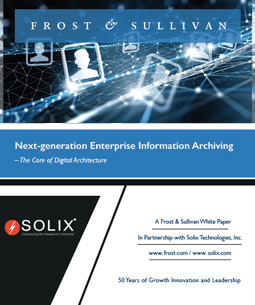
In this white paper, Frost & Sullivan explores the requirements for impactful next-generation enterprise information archiving.
Those requirements include:
- Covers all systems holding corporate data: CRM & ERP systems are standard but also consider custom applications and niche systems. Your EIA platform should handle all your data, structured and unstructured, packaged and custom.
- Offer a single Unified Repository: capable of holding all enterprise data in a scalable, easy to access and compliant manner.
- Cloud native solution: the next-gen EIA applications leverage the public and private cloud platforms to offer organizations the much needed agility, scalability and lower costs.
- Lower cost of compliance: able to classify the data at the time of archiving itself, be able to quickly search the presence of a particular PII across all data sets with a single Google-like search, and then obfuscate, or delete the specific PII records across all archived data sets with a single query.
- Support legal proceedings: data must be made easily accessible to legal teams, allowing for Google-like search functionality to put legal holds on data making it easy to be found later against short warrant deadlines.
- Analytics: provide easy access to all data and quick integration with external analytic platforms such as data lake, data warehouses, and virtualization platforms so analysts can work on all data necessary without delay.
- Lower infrastructure costs: data lifecycle management automatically moves data from tier 1 storage to lower cost media and out of the production database entirely as demand for access to this aging data drops.















